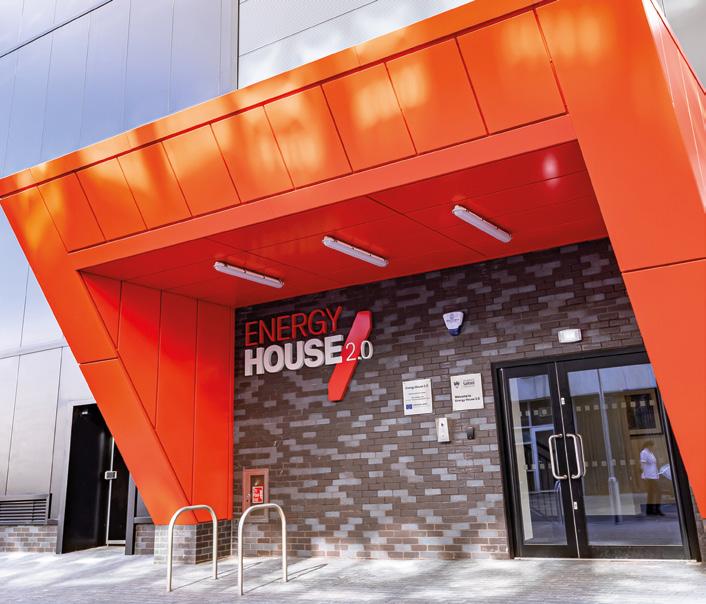THEROAD TO NET ZERO
THE UNIVERSITY OF SALFORD & ENERGY HOUSE LABS


A PHILANTHROPIC PROGRAMME TO TACKLE FUEL POVERTY, BUILD A DIVERSE TALENT PIPELINE IN SUSTAINABILITY AND WORK WITH OUR COMMUNITIES TO DEVELOP HEALTHIER HOMES.
Thanks to the generosity of our donors, we formed Friends of Energy House 2.0, a philanthropic Impact Fund designed to extend the research and reach of our Energy House Labs. Through the Impact Fund, we are able to award a fully funded PhD Studentship, with a focus on future sustainability of housing, and three community outreach programmes which will enable us to engage communities in the region in a range of ways, from educational workshops to an artist residency.
Following on from the success of the 2022 Friends of Energy House 2.0 initiative, the University of Salford and Energy House Labs is seeking partners to join us on the next phase of our philanthropic programme, focusing on the following 3 critical areas:
/ A Sustainable Talent Pipeline: Diversifying & nurturing a talent pipeline in sustainability from undergraduate to PhD; growing the workforce of the future to tackle our climate emergency head-on.
/ Friends of Energy House Labs: A community outreach & impact fund to take the expertise and research of Energy House Labs and extend it into schools and homes across Salford, Greater Manchester and nationally.
/ Tackling Fuel Poverty: Funding research, an event and programme of activity focused on Salford and Greater Manchester in collaboration with the Fuel Poverty Research Network.
Professor Richard Fitton Energy House 2.0 Technical Director
” “
ABOUT ENERGY HOUSE LABS
More than 25% of all the energy used in the UK is used in our homes. Understanding how to use this energy more efficiently is therefore critical in the move to achieving net zero. That is why in 2011 Salford built Energy House; the world’s first full sized, two-bedroom, brick built terraced house constructed inside an environmentally controllable chamber. The facility mimics real-life weather conditions and in collaboration with industry has enabled cutting-edge research, product innovation and testing to improve energy efficiency at home.
In 2022 the University opened the doors to Energy House 2.0; the largest test and research facility of its kind. It contains two environmental chambers each able to accommodate two detached houses. The chambers replicate environmental conditions experienced by 95% of the world’s population, creating temperatures ranging between -20˚C to +40˚C and simulating wind, rain, snow, and solar radiation.
Energy House 1.0 and 2.0, alongside the Zed House, the first home in the UK that takes sustainability beyond the current Future Homes Standards, are award-winning and world-leading facilities that make up Energy House Labs.
Energy House Labs (EHL) has worked with major industry partners and policy makers in the UK and internationally. The facilities provide exceptional opportunities to collaborate with industry, carry out unique research and provide innovative solutions to address net zero, fuel poverty, and build healthy homes on a global scale.
THIS IS PARTICULARLY RELEVANT AS WE FACE A COST-OF-LIVING AND FUEL POVERTY CRISIS.
Salford is the 18th most deprived local authority in England. Families on the university’s doorstep are facing severe financial challenges and struggling to afford to heat their homes.
According to End Fuel Poverty, it is estimated that 7 million households are in the depths of fuel poverty from October 2022, with predictions showing this will rise to at least 8.8 million from April 2023. This is an increase of almost 170% from 2020, where the number of households was at 3.2 million. Since October 2021, the number of warrants issued in England and Wales allowing energy companies to forcibly install prepayment meters in UK homes has increased to 18%. Nearly half a million warrants for forced prepayment meters have been granted in 2022 due to the inability of families to pay their fuel bills.
The situation in the UK for many households is desperate.
We are launching the next phase of our EHL Philanthropic Programme, working with industry partners and individuals to harness the expertise of our facilities on campus and deliver high-impact and quality programmes to benefit our students and our communities at a time when they need it the most.
Climate change is arguably the single greatest threat that we face. The University of Salford recognises this and is playing a leading role in the fight against the climate emergency.


1 DEVELOPING A SUSTAINABLE TALENT PIPELINE
The UK government has an ambition to achieve net-zero by 2050. Greater Manchester is even bolder with a plan to be carbon neutral by 2038.
To meet the UK’s climate target, every major sector in the UK needs to close a significant skills gap. According to the Green Alliance Policy Insight on ‘Closing the UK’s Green Skills Gap’, (Jan 2022) the sectors with the most pressing emissions reductions by 2030 face the most immediate skills shortages, including housing and transport. To reach net-zero, almost all the UK’s current housing stock needs to be retrofitted with energy efficiency measures and low carbon heating systems. The biggest challenge to this is the shortage of skilled workers. Estimates show that around 300,000 new skilled workers are required to meet the skills gap.
The scale of the challenge is significant. There must be a multi-pronged approach of retaining and retraining the existing workforce, reframing roles, inspiring the next generation in STEM qualifications, and improving diversity within the sector to open new avenues for more talent.
The University of Salford can play an important role in building the talent pool that is required across the sector both now and in the future. However, we cannot do it alone.
We are looking to work with our network of industry partners to develop a portfolio of Scholarships & Studentships to attract, retain and inspire more talent into relevant education and career pathways for a sustainable construction sector, with a particular focus on home-growing a workforce in the Northwest of England.
The focus of the Scholarships & Studentships will be on accelerating the best and brightest talent in the field. We will base the awards on merit, with a preference given to those from underrepresented backgrounds to help stimulate a more diverse and inclusive workforce. This could include female students, low-income students (40% of our student population), and first-in-family to attend university (49% of our student population). The University of Salford is committed to improving social mobility; in 2022 we ranked 6th in England and 1st in the Northwest in the Higher Education Policy Institute’s Social Mobility Index.
Together we can build a vibrant workforce for the future in net zero, energy efficiency and sustainable housing.
There are a variety of ways you can get involved to support the programme:
UNDERGRADUATE SCHOLARSHIPS
We are seeking financial support of £10,000 per Scholarship (over 3 years) to support students in the following programmes:
/ BSc Physics
/ BSc Building Surveying
/ BSc Architectural Engineering
/ BEng Electrical and Electronic Engineering.
/ BEng Mechanical Engineering
The Scholarships are offered across the portfolio of ‘feeder’ programmes to our MSc Sustainable Buildings programme, connected to Energy House Labs.

POSTGRADUATE SCHOLARSHIPS
This year we are introducing a new programme: MSc Sustainable Buildings. This programme is integrated into the work of Energy House Labs and will launch for the first cohort of students in September 2023. The University of Salford will be the only provider in the Northwest with this programme at PGT level.
We are seeking partners to support Scholarships for this brand-new MSc programme at a value of £3,300 per student for 1 year of study.
PHD STUDENTSHIP
As a continuation of Friends of Energy House 2.0 in 2022, we’d like to establish another PhD Studentship in Energy Efficiency to further the research of this brilliant facility.
The total cost for a PhD student for 3 years of study is £67,794.
2 FRIENDS OF ENERGY HOUSE LABS
This programme is the next phase of our ‘Friends of Energy House 2.0’ community, now termed ‘Friends of Energy House Labs’.

The ambition of this programme remains consistent with 2022 in that we aim to pool together a collection of donations at a level of £10,000 and create an annual Impact Fund that will be spent on innovative and impactful projects across the following 4 priority areas:
/ Raising awareness amongst the public of climate change issues and ways we can all work to improve our carbon footprint.
/ Education initiatives to empower and upskill young people on critical issues around climate change.
/ Inspiring and engaging the next generation on career pathways in sustainability; building curiosity and cultivating talent from a younger age.
/ Fuel poverty projects that support communities on our doorstep (Salford & Greater Manchester) overcome immediate challenges around the cost of energy and better support, equip and educate families to heat their homes more efficiently and costeffectively in the future.
A Disbursement Board will be established annually to review and agree the spend of the FoEHL Impact Fund.
FUEL POVERTY
Almost a quarter of UK households are now facing fuel poverty. This is a particular problem within Salford and Greater Manchester, where the housing stock is inefficient, and families are already facing hardship.
In central Salford, more than half of young people are growing up in poverty.
Since 2021, there has been an increase of 2.2 million households facing fuel poverty. The knockon impact of the cost-of-living crisis and fuel poverty is significant for households, including poor mental and physical health, social isolation, and hardship. This is outlined in a policy brief put forward by the Fuel Poverty Research Network (FPRN) in November 2022. Dr Graeme Sherriff, Reader at the University of Salford is Chair of the FPRN.
There is inaccurate reporting on the number of households facing fuel poverty and there is an urgent need for more immediate monitoring via government to ensure policies are well designed and targeted according to need.
There also needs to be greater research and investment in home insulation and ways to cost-
effectively replace energy inefficient appliances to make homes more resilient to fluctuating weather conditions in the future. According to End Fuel Poverty, nearly half of low-income households are still living in ‘energy-leaking’ homes. Analysis from the Local Government Association in Sept 2022 predicts that poorly insulated homes will be leaking £12.7 billion of energy over the next two years. Energy House Labs is tackling this issue head on - finding sustainable ways to make homes more resilient for future generations.
We are seeking funding to support a PhD studentship specifically focused on fuel poverty research to work alongside Dr Graeme Sherriff, the Fuel Poverty Research Network and Energy House Labs.
The total cost for a PhD student for 3 years of study is £67,794.
We are also looking to host a symposium and programme of activity in 2023 that brings together researchers, the community, policy makers and industry on the issue of fuel poverty and financial hardship within the Northwest. We are interested in talking to partners who may like to collaborate on this important issue.

3
HOW CAN YOU SUPPORT?
Outlined below are ways you can support the programme across key levels.
HEADLINE ENERGY HOUSE LABS PHILANTHROPIC PARTNER: £105,000
/ A Sustainable Housing Scholarship Programme (this can be named as you like) that would cover:
2 x Undergraduate Scholarships –focused on undergraduate programme areas of your choice.
2 x MSc Sustainable Building Scholarships.
/ A PhD Studentship. This could be with a specific focus on either Energy Efficiency / Sustainable Housing or Fuel Poverty.
/ A £10,000 donation to the Friends of Energy House Labs Impact Fund
ENERGY HOUSE LABS / FUEL POVERTY RESEARCH PARTNER: £68,000
/ A PhD Studentship. This could be with a specific focus on either Energy Efficiency / Sustainable Housing or Fuel Poverty.
ENERGY HOUSE LABS TALENT PARTNER: £30,000 - £50,000
/ A Sustainable Housing Scholarship Programme (this can be named as you like) that would cover:
2 - 4 x Undergraduate Scholarships –focused on undergraduate programme areas of your choice.
2 – 3 x MSc Sustainable Building Scholarships.
/ A £10,000 donation to the Friends of Energy House Labs Impact Fund
FRIEND OF ENERGY HOUSE LABS: £10,000
/ A donation to the Friends of Energy House Labs Impact Fund
Please note that we are open to discussing support at any level and are happy to explore how we can adapt the programme to align with your priorities and interest.
RECOGNITION & REPORTING
Becoming involved in the EHL Philanthropic Programme is a public commitment to helping the fight against the climate emergency, fuel poverty and towards the ambition of net zero by 2050.
Reporting and recognition principles are as follows:
/ Annual report on the impact of funds across all programme areas.
/ Specific updates throughout the year depending on the programme you support.
/ Annual Dinner / Symposium for Energy House Labs community.
/ Marketing & communications showcasing the impact of the projects.
/ Association with a world-leading research facility regularly featured in regional and national news channels (The Sunday Times, The Guardian, BBC, ITV, BBC Breakfast and others).
/ Access to a community of like-mind industry organisations and individuals working together to advance the energy efficiency agenda and tackling fuel poverty.
/ Specific recognition / reporting will be agreed with each donor appropriate to the nature and value of support.
/ For a Headline Energy House Labs Philanthropic Partner, we will work closely with that partner on a bespoke comms and engagement plan to ensure their support and position as headline partner is appropriately recognised.
To Get Involved in this programme, please contact:
Patti Holmes, Head of Alumni Engagement & Development: p.a.holmes@salford.ac.uk
Hannah Fox, Development Officer: h.c.fox@salford.ac.uk
The University of Salford was granted the status of an exempt charity by a Statutory Instrument passed in May 1967. All parts of the EHL philanthropic programme are charitable in nature.









